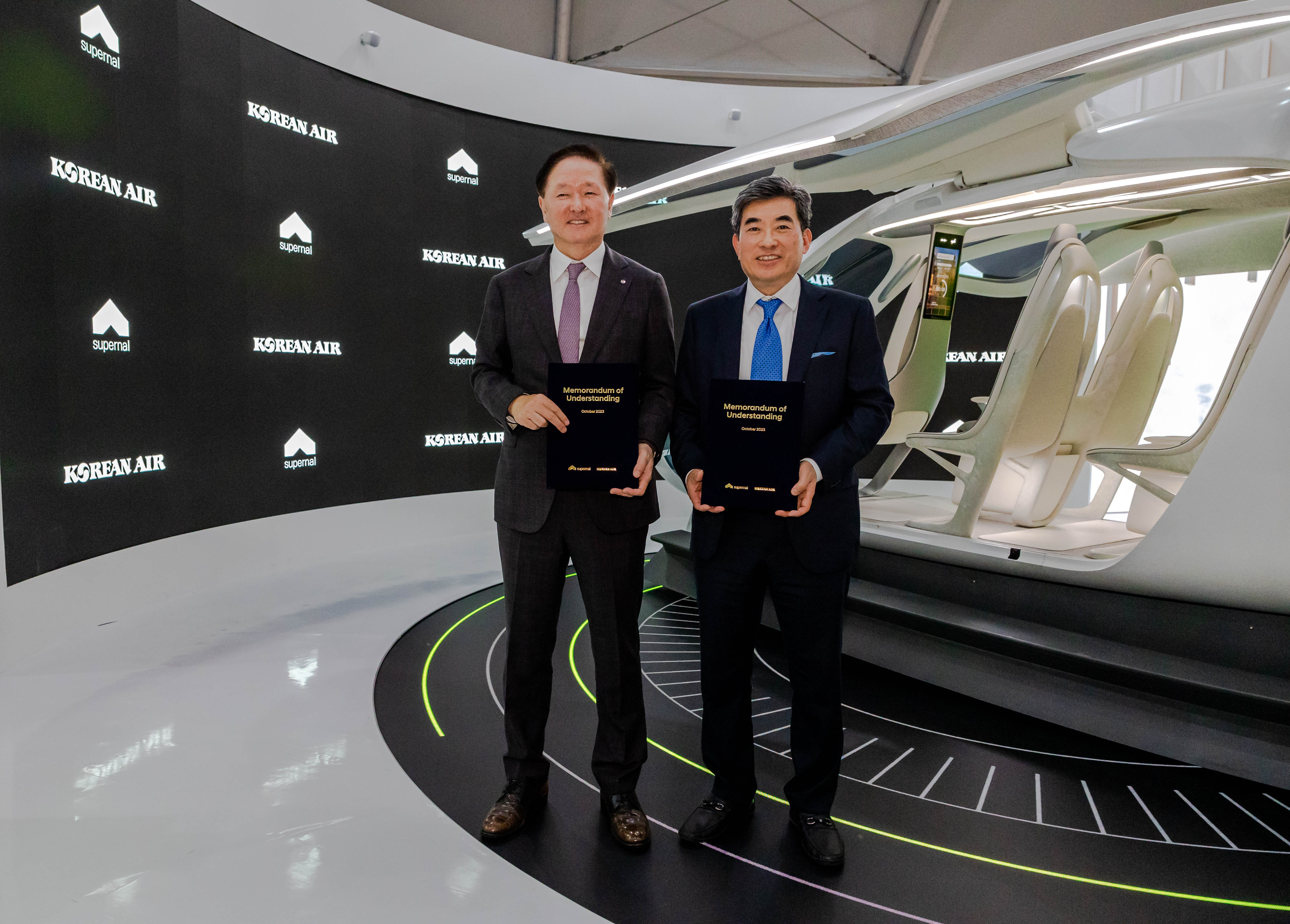South Korea’s efforts to be an advanced air mobility (AAM) early adopter gathered fresh momentum this week, with more announcements from U.S. eVTOL aircraft developers, a major airline, and local government agencies. During this week’s Seoul ADEX aerospace and defense show, the Asian country’s plans to prioritize electric aviation took a high profile.
On October 18, Korean Air sealed its strategic partnership with Supernal, which is backed by South Korean automotive group Hyundai, launching a series of technical projects and workshops aimed at preparing the way to launch air services with the four-passenger SA-1 aircraft. The flag carrier will provide guidance to Supernal on Korean market requirements and support efforts to establish test operations and develop supporting infrastructure.
A day earlier, Overair reported that it had signed a memorandum of understanding to work with Korean industrial group Hanwha Systems and the country’s Jeju special self-governing province. The partners will collaborate in areas such as infrastructure, aircraft manufacturing, maintenance, repair and overhaul services, and crew training. They will also prepare a plan to launch air service with Overair’s Butterfly vehicle for public transportation, medical support, and tourism on Jeju Island.
The Korean government is an enthusiastic backer of AAM initiatives and of efforts to use 5G and LTE mobile communications networks to support the data and comms needs of eVTOL air services. The authorities intend to create dedicated AAM operating corridors that are separate from those employed by helicopters and other low-altitude airspace users to allow for safe connections between vertiports.
“We will cooperate in deriving requirements for eVTOL aircraft optimized for urban air mobility operations based on Korean Air’s accumulated data on aircraft operation and customer boarding experience,” said the airline’s CEO, Keehong Woo. “Based on this, we will strive to develop a business model and build an operating ecosystem suitable for Korea’s environment.”
Supernal expects to submit its application for the SA-1’s type certification to the FAA by year-end. It aims to start flight testing a technology demonstrator aircraft by the end of 2024 and to launch piloted commercial services in 2028. Earlier this week, the company announced a partnership with Honeywell Aerospace to develop ground control stations for subsequent uncrewed or remotely piloted versions of the aircraft.
“A core part of our strategy to advance AAM is the need for robust collaboration and partnerships with industry leaders like Korean Air,” said Jaiwon Shin, president of Hyundai Motor Group and CEO of Supernal. “Korean Air’s expertise in building scalable aviation systems, together with Supernal’s vision for mobility, will help usher in this exciting new era of air travel and bring us closer to global AAM operations."
Jeju Island Seeks Zero Carbon Transportation
Jeju Island is just over 50 miles off the southern coast of the Korean peninsula, with a population of around 700,000. The oval-shaped island, which is around 45 miles long and 20 miles wide, is viewed as having promising geography for early eVTOL air services, which may include connections between resort areas.
Since 2006, Jeju has been a self-governing province of Korea, and local officials led by its governor, Oh Young-hun, are working toward achieving carbon neutrality by 2030. This will involve producing all its energy needs from renewable, zero-emission sources as the island seeks to preserve its status as a registered biosphere, with exceptional geographic and ecological features (including a volcano) that draw tourists from across the world.
“Jeju Island is a beautiful resort destination and it’s an ideal hub for advanced air mobility, given its geography and its ambition to become carbon neutral by 2030,” said Overair CEO Ben Tigner. “We look forward to collaborating with our partners at Hanwha Systems.”
Overair is already working with its investor Hanwha, which includes divisions focused on avionics, communications, and IT, and also with partners including helicopter operator Bristow. The California-based company completed propulsion system testing in the second quarter of 2022 and is now assembling a full-scale prototype aircraft to start flight testing in 2024.
Multiple eVTOL Vehicle Makers Target South Korea
Meanwhile, local start-up Plana is working on a five-seat hybrid-electric aircraft that would have a longer range than the all-electric vehicles of around 300 miles. The company is working to start flight testing a prototype of what it refers to for now as the CopterPlane CP-1 aircraft in 2025, with type certification targeted for 2028.
In July, Korean regional airline Hi-Air signed a provisional order for up to 30 of the CP-1 aircraft. Earlier this year, Plana opened offices in California in order to engage with the FAA and seek partnerships with U.S. companies.
EHang, which last week completed Chinese type certification for its EH216-S two seat autonomous vehicle, in July announced that a South Korean music producer has invested in the company, which is listed on New York's Nasdaq stock exchange. In September, Japan's SkyDrive reported orders from Korean leasing group Solyu, which has also committed to buying 25 of Eviation's fixed-wing Alice all-electric regional aircraft.
